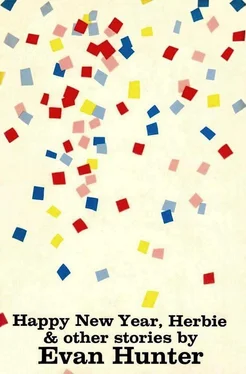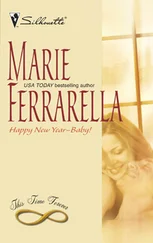Evan Hunter
Happy New Year, Herbie and other stories
Here is the man with three staves, and here the Wheel,
And here is the one-eyed merchant, and this card,
Which is blank, something he carries on his back,
Which I am forbidden to see. I do not find
The Hanged Man. Fear death by water.
I see crowds of people, walking round in a ring.
Thank you. If you see dear Mrs. Equitone,
Tell her I bring the horoscope myself:
One must be so careful these days.
— T. S. Eliot
The T. S. Eliot quotation is from “The Waste Land” in Collected Poems of T. S. Eliot , copyright 1936 by Harcourt, Brace & World, Inc., and reprinted with their permission.
“The Innocent One,” Copyright 1953 by Evan Hunter; “Million Dollar Maybe,” Copyright 1953 by Evan Hunter; “The Fallen Angel,” Copyright © 1955 by Evan Hunter; “On the Sidewalk, Bleeding,” Copyright © 1957 by Evan Hunter; “Pretty Eyes,” Copyright © 1957 by Evan Hunter; “The Prisoner,” Copyright © 1957 by Evan Hunter; “Alive Again,” Copyright © 1958 by Evan Hunter; “The Tourists,” Copyright © 1960 by Evan Hunter; “The Final Yes,” Copyright © 1962 by Evan Hunter; “Happy New Year, Herbie,” Copyright © 1962 by Evan Hunter; “S.P.Q.R.,” Copyright © 1963 by Evan Hunter; “Uncle Jimbo’s Marbles,” Copyright © 1963 by Evan Hunter.
Last summer they quarantined the camp two weeks after we’d arrived.
Uncle Marvin called all us counselors into the dining room one July night and announced briefly that there was a polio scare at a nearby camp. He went on to say that whereas all of our campers had of course been vaccinated, he nonetheless felt it would be in the best interests of public safety if we voluntarily agreed not to leave the campgrounds until the threat had subsided. The words “public safety” were Uncle Marvin’s own. He was the principal of a junior high school in the Bronx, and he also happened to own Camp Marvin, which is why it was called Camp Marvin and not Camp Chippewa or Manetoga or Hiawatha. He could have called it “Camp Levine,” I suppose, Levine being his last name, but I somehow feel his choice was judicious. Besides, the name Marvin seemed to fit a camp whose owner was a man given to saying things like “public safety,” especially when he became Uncle Marvin for the summer.
I was Uncle Don for the summer.
The kids in my bunk had never heard of Uncle Don on the radio, so they never made any jokes about my name. To tell the truth, I’d barely heard of him myself. Besides, they were a nice bunch of kids, and we were getting along fine until the voluntary quarantine in the best interests of public safety was declared by Marvin, and then things got a little strained and eventually led to a sort of hysteria.
Marvin’s wife was named Lydia, and so the girls’ camp across the lake from Camp Marvin was called Camp Lydia, and the entire complex was called Camp Lydia-Marvin, which was possibly one of the most exciting names in the annals of American camp history. I was Uncle Don last summer, and I was nineteen years old. Across the lake in Camp Lydia was a girl named Aunt Rebecca, who was also nineteen years old and whom I loved ferociously. When the quarantine began, I started writing notes to her, and I would have them smuggled across the lake, tied to the handles of the big milk cans. I love you, Aunt Rebecca, my notes would say. And I would look across the still waters of the lake and try to imagine Becky opening my note, her dark eyes lowered as she read the words, her quick smile flashing over her face. I imagined she would look up hastily, she moved hastily, her eyes would dart, the smile would widen, she would stare into the distance at the pine trees towering over the boys’ cabins, and maybe her heart would skip a beat, and maybe she would murmur softly under her breath, I love you, too, Uncle Don.
I hated Camp Marvin.
I will tell you what I loved.
I loved Rebecca Goldblatt, that’s all. I had loved Rebecca Goldblatt long before I met her. I had loved her, to tell the truth, from the day I was twelve years old and was allowed to join the adult section of the public library. I had clutched my new card in my hand that bright October day, the card unmarked, every space on it empty, and wandered among the shelves. It was very warm inside the library, warm and hushed, and as I walked past the big windows I could hear the wind outside, and I could see the huge tree out front with its leaves shaking loose every time there was a new gust, and beyond that on the other side of the street some smaller trees, bare already, bending a little in the wind. It was very cold outside, but I was warm as I walked through the aisles with a smile on my face, holding my new library card, and wondering if everyone could tell I was an adult now, it said so on my card.
I found the book on one of the open shelves. The cover was red, tooled in gold. The title was Ivanhoe .
And that night I fell in love with Rebecca, not Rebecca Goldblatt, but the girl in Ivanhoe. And then when they re-released the movie, I fell in love with her all over again, not Elizabeth Taylor, but Rebecca, the girl in Ivanhoe . I can still remember one of the lines in the movie. It had nothing to do with either Ivanhoe’s Rebecca or my own Rebecca Goldblatt, but I will never forget it anyway. It was when Robert Taylor was standing horseless, without a shield, trying to fend off the mace blows of the mounted Norman knight. And the judge or the referee, or whatever he was called in those days, looked at Robert Taylor, who had almost hit the Norman’s horse with his sword, and shouted, “Beware, Saxon, lest you strike horse!” That was a rule, you see. You weren’t allowed to strike the horse.
Oh, how I loved Rebecca Goldblatt!
I loved everything about her, her eyes, her nose, her mouth, her eyes. Her eyes were black. I know a lot of girls claim to have really black eyes, but Rebecca is the only person I have ever known in my entire life whose eyes were truly black and not simply a very dark brown. Sometimes, when she was in a sulky, brooding mood, her eyes got so mysterious and menacing they scared me half to death. Girls’ eyes always do that to me when they’re in that very dramatic solitary mood, as if they’re pondering all the female secrets of the world. But usually her eyes were very bright and glowing, like a black purey. I shouldn’t talk about marbles, I suppose, since marbles started all the trouble that summer — but that was how her eyes looked, the way a black purey looks when you hold it up to the sun.
I loved her eyes and I loved her smile, which was fast and open and yet somehow secretive, as if she’d been amused by something for a very long time before allowing it to burst onto her mouth. And I loved her figure which was very slender with sort of small breasts and very long legs that carried her in a strange sort of lope, especially when she was wearing a trenchcoat, don’t ask me why. I loved her name and the way she looked. I loved her walk, and I loved the way she talked, too, a sort of combination of middle-class Bronx Jewish girl with a touch of City College Speech One thrown in, which is where she went to school and which is where I met her.
I think I should tell you now that I’m Italian.
That’s how I happened to be at Camp Marvin in Stockbridge, Massachusetts, with a girl named Rebecca Goldblatt across the lake in Camp Lydia.
I know that’s not much of a problem these days, what with new nations clamoring for freedom, and Federal troops crawling all over the South, and discrimination of all sorts every place you look. It’s not much of a problem unless you happen to be nineteen years old and involved in it, and then it seems like a pretty big problem. I’m too young to have seen Abie’s Irish Rose, but I honestly don’t think I will ever understand what was so funny about that situation, believe me. I didn’t think it was so funny last summer, and I still don’t think it’s funny, but maybe what happened with Uncle Jimbo’s marbles had something to do with that. I don’t really know. I just know for certain now that you can get so involved in something you don’t really see the truth of it anymore. And the simple truth of Becky and me was that we loved each other. The rest of it was all hysteria, like with the marbles.
Читать дальше












